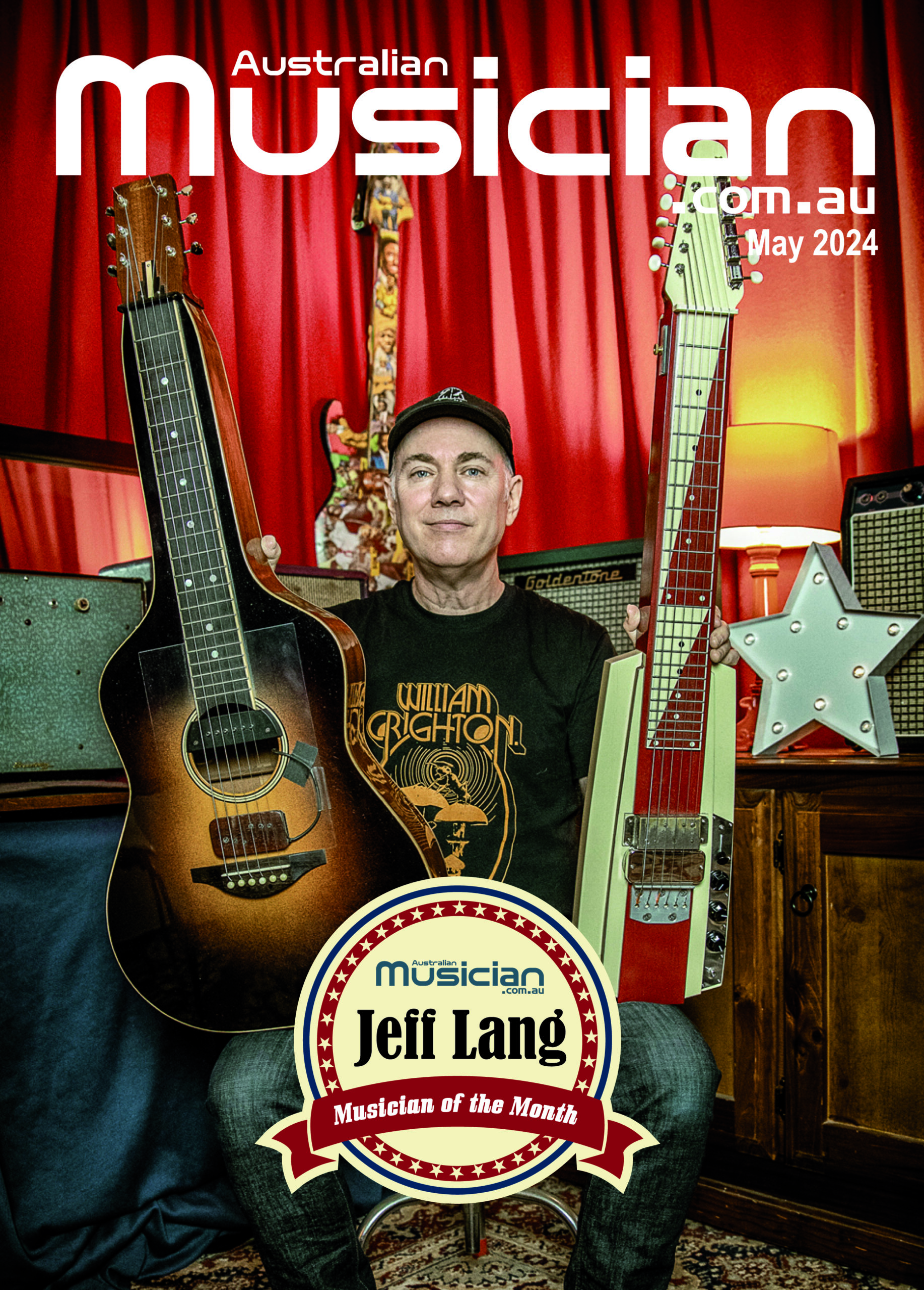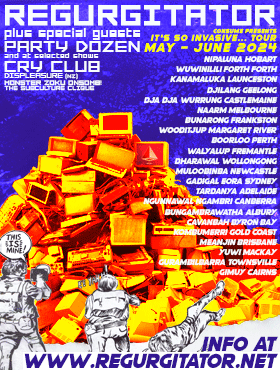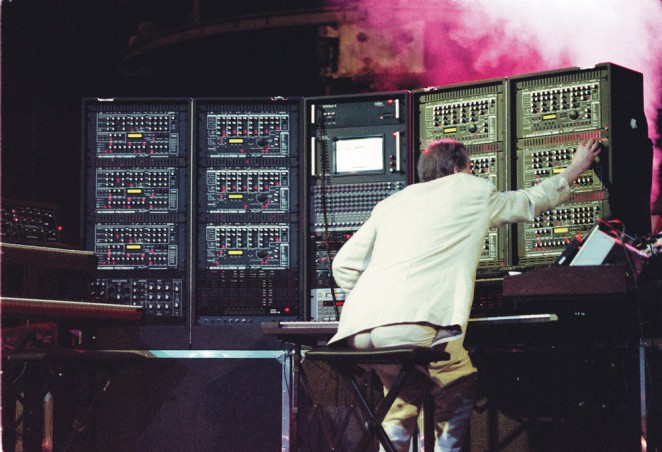
Australian Musician’s Baz Bardoe catches up with electronic music pioneer, former Tangerine Dream and Ash Ra Tempel member, Klaus Schulze.
Almost all humans have heard of Pink Floyd and been exposed to their use of synthesisers, audio effects, and recordings of ambient sounds. For all their song craft, a big part of Floyd’s appeal is their more abstract soundscapes. Very nearly as many people have been exposed to the electronic music of Jean-Michel Jarre, most notably his iconic album ‘Oxygene’. A great many people have heard the music of Tangerine Dream, especially since it has featured on numerous movie sound tracks. But in terms of the Australian experience of electronic and experimental music there is a giant of the genre – literally (he is 1.94 metres tall) and figuratively – who has not always received as much recognition. His name is Klaus Schulze. He has released over sixty albums, and is a former member of Tangerine Dream.
Schulze was born in Germany in the late 1940’s. He first appeared on the music scene as drummer for a band called Psy Free. He met Edgar Froese in the Zodiac Club in Berlin, and helped form the first incarnation of Tangerine Dream. He played drums on the debut album ‘Electronic Meditation’ , before leaving to help establish another iconic ‘Krautrock’ outfit, Ash Ra Tempel. Their self titled debut is considered a genre defining classic of ambient space rock. Schulze then left that band to start what turned out to be a very successful solo career. His first album ‘Irrlicht’ featured an organ and a recording of an orchestra heavily mutated by the use of effects. Despite the fact he didn’t use a synthesiser on this album it is considered by many to be a classic of the emerging electronic music genre.
There is a strong argument that his success in France, as well as that of Tangerine Dream, paved the way for the huge breakthrough Jarre enjoyed
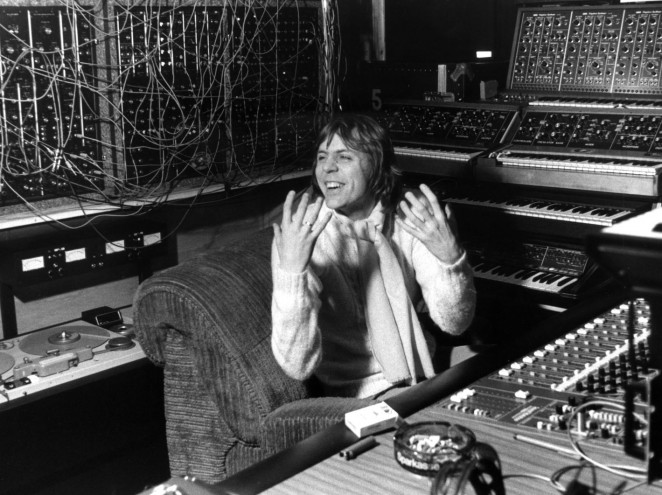
From this point on synthesisers became the dominant part of his sound, and the albums ‘Timewind’ and ‘Mirage’ have been listed in the top twenty five ambient albums of all time. During the mid seventies he enjoyed huge success especially in France where he was a bona fide star, achieving six figure sales and filling large venues. There is a strong argument that his success in France, as well as that of Tangerine Dream, paved the way for the huge breakthrough Jarre enjoyed. His long time friend, publisher and sometimes producer Klaus D Mueller recalls,
“KS was of superstar statue in France during 1975, ’76, ’77, ’78, ’79. The two biggest pop/rock magazines were full of articles, interviews and great reviews of and about KS, his albums and concerts, as well as long series to explain this new technology, made from long KS interviews. Klaus’ records during these years reached the French charts, KS’ French concerts were on the same level and in the same venues as all the other rock heroes’ concerts. All of a sudden there was a French guy, coming out of musical nowhere (from the advertising scene), doing the same as KS did very successfully, but with a bit more calculated pop approach, with hook-lines and other formula that a hit needs, and: in a flash, a home-brewed French superstar was born: Jean Michel Jarre. (A friend who teaches at a French school told me recently (in 1995) that he always has to explain to his kids that “Electronic Music” was not invented by Monsieur Jarre)” (http://www.klaus-schulze.com/bio/ksse1.htm )
Schulze was quick to adopt digital technology in the early 80’s giving his music a more ‘precise’ sound. In the early 90’s he adopted sampling technology, but soon reverted to more traditional approaches much to the delight of his long term fans. Since then he has collaborated with the likes of vocalist Lisa Gerrard, whose abstract improvisations sit comfortably with synthesis and Schulze’s of ten long and complex pieces. He often describes his studio equipment as ‘colleagues’, and those that misbehave find themselves banished for periods of time. But interestingly for a man who has embraced new technology his entire career he avoids making his work available for download. You can buy the artefact as a CD, or miss out.
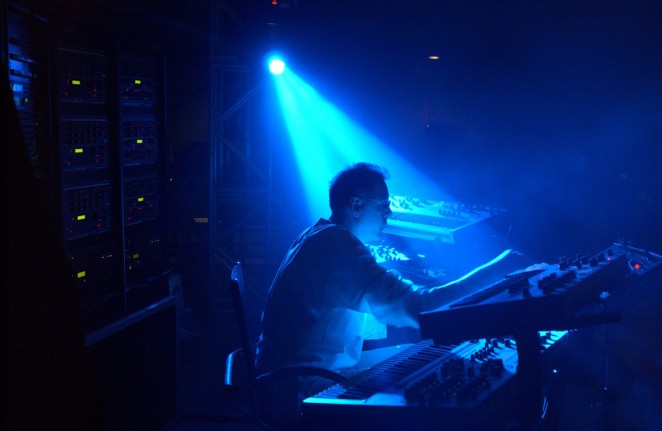
He remains a towering figure in electronic and experimental music.
I recently had the chance to pose some questions to an artist who is one of my absolute favourites. I especially appreciated his thoughts on downloading music.
Baz: You originally started your music career as a drummer. I am curious about the point at which you became interested in electronic music, and especially the creative possibilities of the synthesiser. When did you decide to explore electronic music and what was the impetus for this?
KS : Sorry, but I don’t remember any special point, date, or happening. Please remember, this was circa 45 years ago. Maybe, a change was in the air.
When you first started working with electronic music did you have a vision of the sounds you were trying to create, or did the equipment start to suggest the sound palette? Or is such compartmentalisation not the best way to think about it?
I prefer the last of your suggestions. Of course, I can have “visions of sounds”, but they are pointless if I don’t have the right tools to bring them to live. Which probably means, that it’s both: the “vision” and the “equipment”. They are interdependent.
You were keen to embrace the changes in technology such as digital, sampling etc. And yet when it comes to releasing material you prefer the physical artefact rather than downloads – can you explain a little of your rationale for this?
1) Maybe I’m old fashioned.
2) With downloads the artist earns no money or (at least) much less money. After all, doing music is my profession and I have to live from that.
3) It’s a question of the sound.
4) Imagine to download the eight or nine parts of some of my longer composition, parts that are not separated but belong together; but the download dealer offers them as eight or nine single tracks, and the listener of this music has now eight or nine separate titles. To get the music correct as one continuous title, he must bring them into the correct order. After all, I don’t produce 3-minute pop songs. And not just for this reason, lovers of classical music don’t listen much to downloaded tracks, they prefer to listen to the whole opera, the whole symphony or concert recording, in the best quality possible. I have the same standard and demand.
When you started in music people learned about new artists via word of mouth, posters, magazines etc. Now there is the internet, social media and so on. Information is being exchanged very quickly and it is possible to hear new music and share it very quickly. I am interested in your views on this, especially in terms of whether this is a progression in terms of how we experience and appreciate music.
H’m. “Word of mouth” is still the best ‘propaganda’. Poster? I don’t remember that posters had an influence on the kind of music I was listening when I was younger. (Posters? Strange. Was that in Australia ?)
You forgot the radio; radio was THE medium for bringing music, new music to the listeners and maybe consumers. At least in Europe and the USA, but maybe also in Australia. Radio is still there, its importance isn’t so big anymore, but it still exists. Internet is today, what radio was in the fifties to eighties. Not for me, but for ‘the people’, the young people.
In fact, this is a question you should ask the folks who buy the music, who listen to the music. Most probably it’s also a question of the age, of maturity. “Learning about new artists” is mostly an activity of the younger people, and here we come back to the point “word of mouth”: these youngsters mostly listen to what their friends are listening. With exceptions. I suppose this is not much different from the time when I was a teenager. It’s just that the media has changed. The discos (formerly: “dance halls”) are called “clubs” today. But it’s still the same old story…
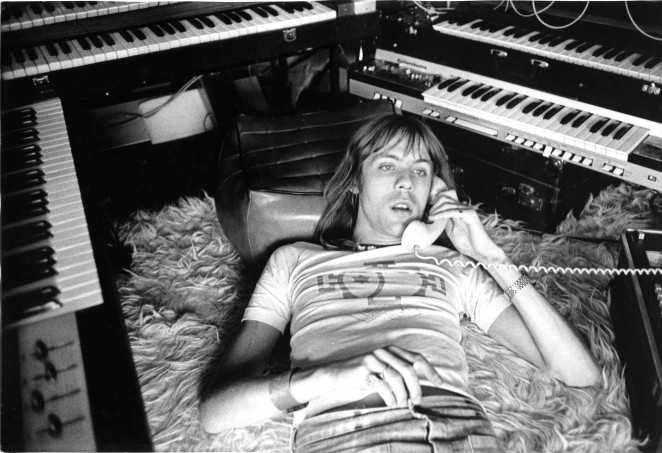
The new technology, particularly the delivery platforms which allow us to experience and share music imply different ways of organising ourselves and inter relating. Your concerts will be available for anyone to view, almost anywhere in the world, for as long as the internet exists. How do you think this has impacted upon the sense of community that fans of a musical act may experience?
I understand what you mean, that a concert film can be bought as DVD or seen (illegally) on Youtube? If this has an impact on fans, and if, which … I don’t know. You have to ask the fans.
Personally I have the feeling that the permanent presence and the possibility to listen (and watch) at any time you want, makes music less precious. There is the rule that everything that costs nothing is worthless. I fear this is true. I remember the times when I had to save money to get the new single from the “Ventures” or “Spotnicks” and later the last LP by a new group with the strange name ‘Pink Floyd’. Today people have the complete output of a group or an artist as mp3 on their iPod (and harddisk). Often downloaded or copied without any payment (except of course to Apple for the hardware).
Technology has brought tremendous change during the period of your career – do you see it as being a fairly linear progression towards better outcomes for artist and listener, or are there some things which were better in earlier technological iterations?
Some of the new technique was, or is helpful, some not. You can create something beautiful or something awful, the necessary technique is just a tool. You can even avoid a “new technique”, if you want. Singers are still singing with their voice, and most people love it. Of course the public asks mostly for “the newest” if they have heard about “the newest”. Yes, I remember the struggle in the mid and late seventies, especially by Japanese companies, to bring their new instruments to the awareness of the musicians and the public.
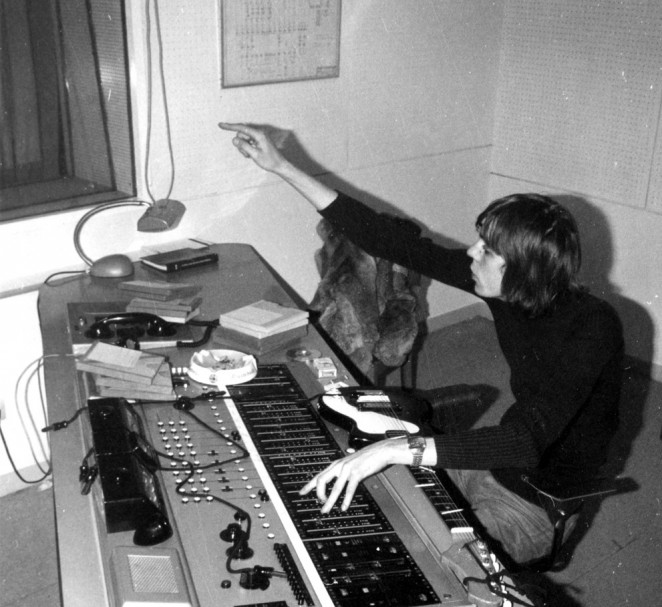
Some musicians prefer live work over studio recording and vice versa, whilst some enjoy both about equally. Do you have a preference?
Both is very different and therefore, both is very fine for me.
Thinking about your career as a whole, can you name some of the key pieces of equipment that have been integral to your progression as an artist?
What comes to my mind without checking in my own website, and in the order in which I have obtained and used them circa forty years ago: The EMS Synthi A, ARP Odyssey, Farfisa Syntorchester, Moog Synthesizer IIIp plus Sequencer, Minimoog, Yamaha CS 80 … that was for the first few years. Not to forget the mixer, echo, and other effect gadgets. Later it was computers, many, many studio gear, software, etc. Too much to make a list. From the very first equipment I still use the EMS and a Minimoog. For sentimental reasons.
Can you name key equipment in your studio? And in your live rig? (I read that you were no longer going to do live performances, so if this is the case can you talk about your equipment used on your last live shows?)
Too much! Strange and funny: People look too much onto the instruments, the brands, the newest software, or they love & discuss the ‘vintage’ stuff, at least in “my kind of music”.
Since you started creating music there have been many changes, not only in technology, but also in terms of how many people are involved with electronic music and so forth. How do you see the current state of electronic music? Are you positive about where it is headed in general?
I don’t know much about the current state of Electronic Music. What I hear by accident, some of it sounds good to me, some bad, and the majority is in the middle. As always, with music and the personal taste, I suppose.
Given you have experienced and incorporated a great deal of technological change during the course of your career would you care to peer into the crystal ball and try to make some predictions about the future? What changes lie ahead both in terms of how we make music – the technology – and how we interact with it? Any thoughts?
I am very often asked in interviews about “some predictions about the future” I always give the same answer: I am not a fortune teller and I don’t have the ambition to be one. I am only astonished about all the different artists who seem to have an answer.
Looking at the totality of your career, what pieces of work are you most happy with and why? What – if anything – do you have left on your ‘to do’ list?
Again a question which is not asked for the first time. And I give the same answer as I give always: I like all my work, otherwise I would not have done it. The German writer Arno Schmidt once answered to that: “Unfair question. Of course I tried hard with all of them.”
For me it is as if someone asks: What was the best girl or wife in your life?
For some really insisting journalists who also ask me for the “worst”, I gave for many years the answer: “Blackdance”. Just to soothe them 🙂
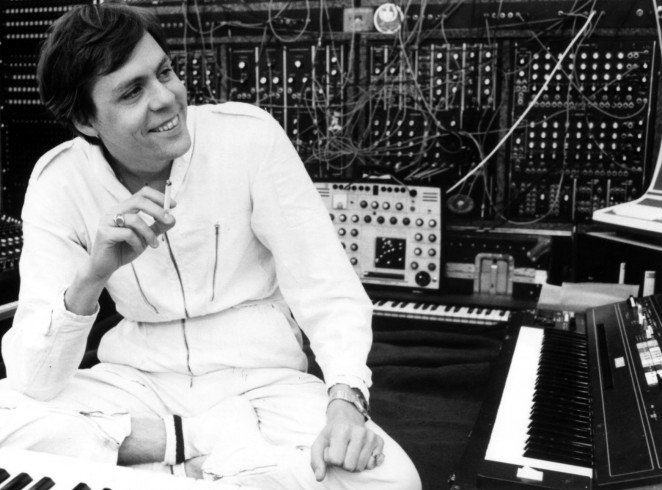
Thinking back to your decision to leave Tangerine Dream, can I ask what your motivation was? And why have you chosen to pursue a solo career under your own name? Has there been advantages/disadvantages compared to being part of a group? I ask this because it is often a difficult decision for musicians, and I have had responses from artists previously that cover a broad spectrum of approaches.
The story is often told: I was the drummer of – at this time – a basically guitar-bass-drums trio, and Edgar (three years older than me) was the boss; Hendrix was his idol. I had some strange musical ideas (Conrad too). At a concert I wanted to play over the speakers some pre-recorded organ tapes, backwards, but Edgar got upset: “Either you play just drums or you leave.” I left. No anger, no grudge. Later and over the years we met sometimes, at a concert or private, and often we were laughing when we talked about old times.

